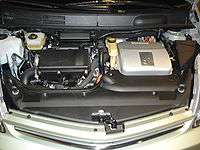Toyota NZ engine
The Toyota NZ engine family is a straight-4 piston engine series. The 1NZ series uses aluminum engine blocks and DOHC cylinder heads. It also uses sequential fuel injection, and has 4 valves per cylinder with VVT-i.
1NZ-FXE

The 1NZ-FXE is the earliest 1.5 L (1497 cc) version built in Japan. Bore is 75 mm (2.95 in) and stroke is 84.7 mm (3.33 in). It features forged steel connecting rods and an aluminum intake manifold. The engine has a high physical compression ratio of 13.0:1, but the closing of the inlet valve is delayed, for an effective compression ratio of 9.5:1[1]. The net result is that the engine has a greater effective expansion than compression—making it a simulated Atkinson cycle, rather than a conventional Otto cycle.
The reduction in cylinder charge means reduced torque and power output, but efficiency is increased. This combination makes the 1NZ-FXE suitable for use with the Hybrid Synergy Drive, where peak torque and power are of less importance. Output is 57 kW (76 hp) at 5000 rpm with 115 Nm (85 lb·ft) of torque at 4000 rpm. Thermal efficiency is about 37%.[2] Production was discontinued in 2009, with the arrival of the Prius Gen 3, which replaced the 1NZ-FXE with the 2ZR-FXE.
In 2012, upon the arrival of the Prius c (North America), the Prius Aqua (Japan), and the Yaris Hybrid (Europe), an improved version was introduced. Without any belt-driven accessories, and a physical compression ratio of 13.4:1, the new version delivers an output of 54 kW (74 hp) at 4800 rpm with 111 Nm (82 lb·ft) of torque at 3600–4400 rpm.
The 1NZ-FXE Hybrid Synergy Drive in the Toyota Prius has won several International Engine of the Year awards:
- Best Eco-friendly 2000
- Best Eco-friendly 2001
- Best Fuel Economy 2005
- Best 1.4-litre to 1.8-litre 2005[3]
- Best Fuel Economy 2006
- Best 1.4-litre to 1.8-litre 2006[3]
Applications:
- Toyota Prius (XW10 & XW20)
- Toyota Prius c
- Toyota Yaris
- Toyota Corolla (Axio/Fielder)
- Toyota Sienta (2nd generation)
1NZ-FE
The 1NZ-FE is a 1.5 L (1497 cc) conventional Otto-cycle variant of the 1NZ-FXE with VVT-i. The engine block is found in many Toyota models assembled in Japan and Asian countries. It retains the same bore and stroke, but the compression ratio is lowered to 10.5:1. Output is 81.2 kW (109 hp) at 6000 rpm with 141 Nm (103 lb·ft) of torque at 4200 rpm. The redline is 6400 rpm.
Applications:
- Toyota Vios/Belta
- Toyota Yaris/Echo
- Scion xA/ist
- Scion xB (1st generation)/Toyota bB (1st generation)
- Toyota Raum
- Toyota Porte
- Toyota Platz
- Toyota Ist
- Toyota Auris
- Toyota Fun Cargo
- Toyota Premio
- Toyota Allion
- Toyota Sienta
- WiLL VS
- Toyota Probox
- Toyota Ractis
- Toyota Corolla (Axio/Fielder, RunX, Allex)
- Geely CK (Produced under license)
- Geely MK (Produced under license)
- Great Wall C10
2NZ-FE
The 2NZ-FE is a 1.3 L (1298 cc) version built in Japan. Bore is 75 mm and stroke is 73.5 mm, with a compression ratio of 10.5:1. Output is 63 kW (84 hp) at 6000 rpm with 121 N⋅m (89 lb⋅ft) of torque at 4400 rpm.
The Toyota 2NZ-FE 1.3 L engine was designed in 1999 with Otowa Yamaha as the head engineer of the project. Toyota introduced the VVT-i system on the 2NZ-FE to improve fuel efficiency and emissions.
Applications:
- Toyota Yaris/Echo/Vitz
- Toyota Vios/Belta
- Toyota Platz
- Toyota Porte
- Toyota Corolla (E140), Pakistan only
- Toyota Corolla (E170), Pakistan only
- Toyota bB
- Toyota Ist
- Toyota Corolla (E120), Japan and Middle East only
See also
References
- ↑ "Car and Driver 2004 Toyota Prius Specs" (PDF).
- ↑ "Toyota targeting thermal efficiency of more than 45% for next-generation gasoline engines for hybrids". Green Car Congress. Retrieved 3 May 2015.
- 1 2 "Archive | International Engine of the Year". Engine Technology International magazine. Retrieved 10 February 2015.
External links
| Wikimedia Commons has media related to Toyota NZ engines. |